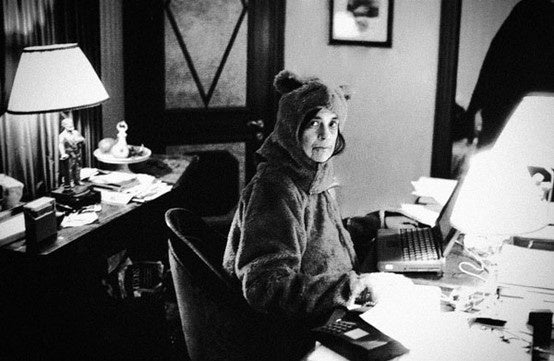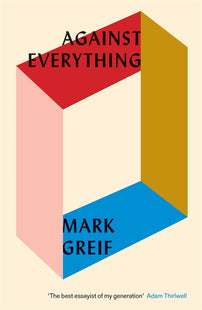Five Book Plan: Essay Collections
Mark Greif picks his favourite essay collections, from Virginia Woolf to Susan Sontag, for the latest Five Book Plan.

The Female Thing by Laura Kipnis (Serpent's Tail, 2007)
Kipnis has the courage to say what others don’t. She has no sanctimony, only attack. Her impulse is libertarian in the good sense, i.e. liberationist, and soulful. But she also seeks to write for an imagined big audience, and this confuses matters a bit. This book undertakes a mixed phenomenological and psychological account of parts of female bodily life not easily “solved” by reformist, voluntarist, and commercial forms of feminism—the areas of the subtitle: “Dirt, envy, sex, vulnerability.” Once you realize what she is saying each time, you are amazed at the long logical chains she has forged, her intellectual force, but also that she has the courage to say it. “Right-minded” dull people would not understand. But I think people don’t in fact understand the book—they think it is light—it is joking—ha ha. It is not joking. They don’t see what it is saying. Otherwise they would probably wax indignant; but the rest of us should read it. It is not light. A profound book.
Under the Sign of Saturn: Essays by Susan Sontag (Penguin, 2009 [1980])
Her book Against Interpretation is better known and was more influential but this collection is better written and stronger. The essays are more concentrated and longer. Her appreciation of the anarchist-counterculturalist Paul Goodman is beautiful and ambivalent. Her study of the latterday appeal of the style of Fascism, and all her other essays on intellectual figures, both heroes and villains, are strong and satanic and ambivalent. Very good.
The Essential Marcuse: Selected Writings of Philosopher and Social Critic Herbert Marcuse by Herbert Marcuse (Beacon Press, 2007)
I have always liked Marcuse the best. He lived his principles. HE also knew the pleasure of driving a fast car with the top down even as he wanted justice for the workers who built it and a good society, a really liberated society, for everyone on the roads and in the fields alongside them. For everyone everywhere. Eros, libido, and justice, all together. Fearsome dialectician—not afraid of Utopia. Not afraid of the practical. Not afraid of joy and rage. Impractical when needed. He told Heidegger how much his mentor’s work had meant to him, and he told Heidegger he was a shameful delusionary Nazi coward without the force of mind to realize what he had championed. Very lucid, that Marcuse. This particular collection is not the only place to go—the many expensive volumes of his Collected Papers from Routledge are eye-opening and of course his full-length books are indispensable.
The Death of the Moth by Virginia Woolf (Harcourt Publishers, 1974)
“Street Haunting” is alone worth the price of the collection. “The Death of the Moth” plus “Three Pictures” together would almost be. Then the many reviews from ordinary book supplements show what an extraordinary command of words, a sorcery of words, can do even for banal forms. To quote her sentences one by one is to make Woolf sound “fine” or “coy.” In fact the secret of her prose is its extreme physicality, and muscularity, its spring and its movement. All her work is walking work. The mind is out of its cage. Tiger-like. True of the novels as well as the essays. It’s no surprise that a woman who was a better novelist than anyone else in her era was also a better essayist.
Nature and Selected Essays by Ralph Waldo Emerson (Penguin Classics, 2003 [1836])
They never grow old. Nor do they ever become entirely likeable. Nor should they. But whatever is good and whatever is evil in the American character structure and imagination of itself is in these essays. They function likes series of aphorisms and notes to the self. Yet they are also sermons and self-help tracts. They cohere but they aren’t consistent. They are wells of dark water. The stars reflect in their blackness.
— Mark Greif is a founder and Editor of the journal n+1, and author of Against Everything: On Dishonest Times.
[book-strip index="1" style="buy"]“Mark Greif writes a contrarian, skeptical prose that is at the same time never cynical: it opens out on to beauty and the possibility of change.” – Zadie Smith
Against Everything is a thought-provoking study and essential guide to the vicissitudes of everyday life under twenty-first-century capitalism.
